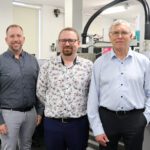Curtin University is conducting a collaborative research project to map the charitable food sector and determine whether homeless and disadvantaged groups have access to the food support services they need.
Dr Christina Pollard, School of Public Health, said the Western Australian community was faced with increasing numbers of people vulnerable to food insecurity due to their economic or social circumstance.
“It is estimated that 10,000 people are homeless in WA and with the decline of the resource sector boom and diminishing government support, the number of families and individuals seeking emergency food relief is increasing,” said Dr Pollard.
The charitable food sector provides food to those in need through pantries, parcels, meal services, and mobile soup kitchens, and is struggling to provide enough food in its emergency food relief response.
There is concern, however, about whether the food provided by emergency food relief is meeting the nutrition and health needs of its recipients.
“We know diet-related diseases are common in vulnerable populations, particularly the homeless, and this project will investigate the nutritional value of the food being supplied,” said Dr Pollard.
“We will inventory the types of food provided, assess recipients’ dietary intake, and describe the perceptions of appropriateness and effectiveness of services from both the organisations themselves and their recipient’s perspective.”
Reduced community tolerance for homeless people and food support services, further compounds the issue. A trend to try to remove food assistance from inner city streets is gaining popularity.
“Services themselves agree that feeding people on the streets is less than ideal. This research aims to create community food security through a sustainable food system which maximises community self-reliance and social justice,” said Dr Pollard.
The Curtin research project will be conducted in three consecutive parts:
- A comprehensive mapping exercise describing the players, relationships and key functions of the inner city Perth charitable food sector;
- An assessment of direct services’ perspectives on the appropriateness and effectiveness of their services; and
- An assessment of the direct service recipients’ perspectives on the appropriateness and effectiveness of services and their dietary intake and food sources.
Several organisations will work together to answer questions about who operates in the charitable food space and what can be done to continue to provide safe, culturally acceptable, nutritionally adequate food to the people who need it.
“Homelessness is not a choice and can affect anyone, at any time,” said Dr Pollard.
“The causes of homelessness are numerous and diverse. There is no one solution but there are steps we can all take to ensure the homeless and disadvantaged receive as much support as possible.”
The project has been funded by Healthway and will run in collaboration with the Salvation Army, Anglicare, WACOSS and FoodBank WA. It will commence in August 2015 and preliminary results will be available at the end of the year.


